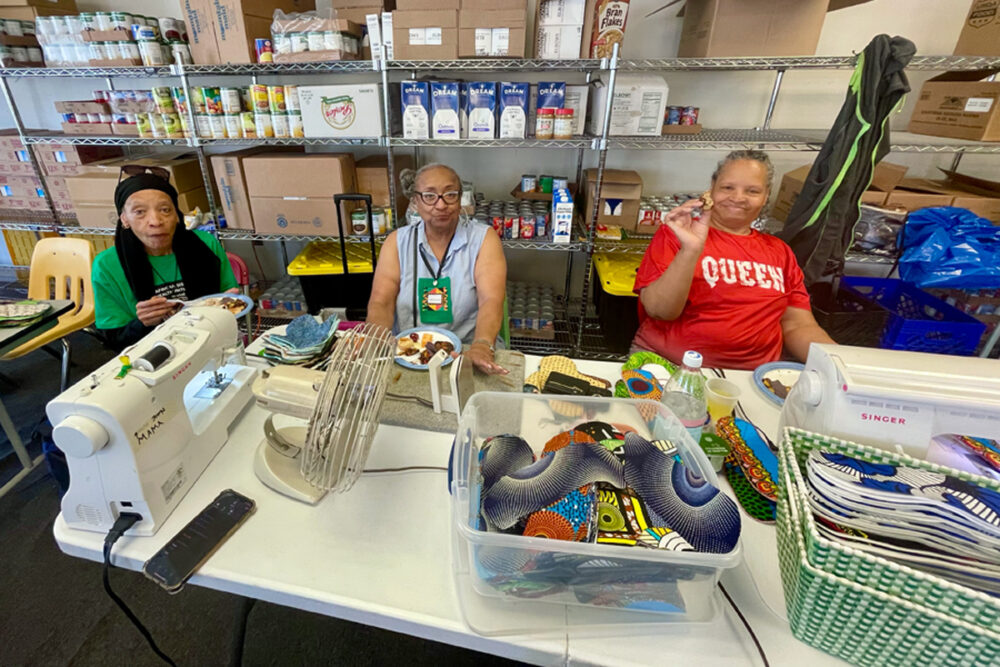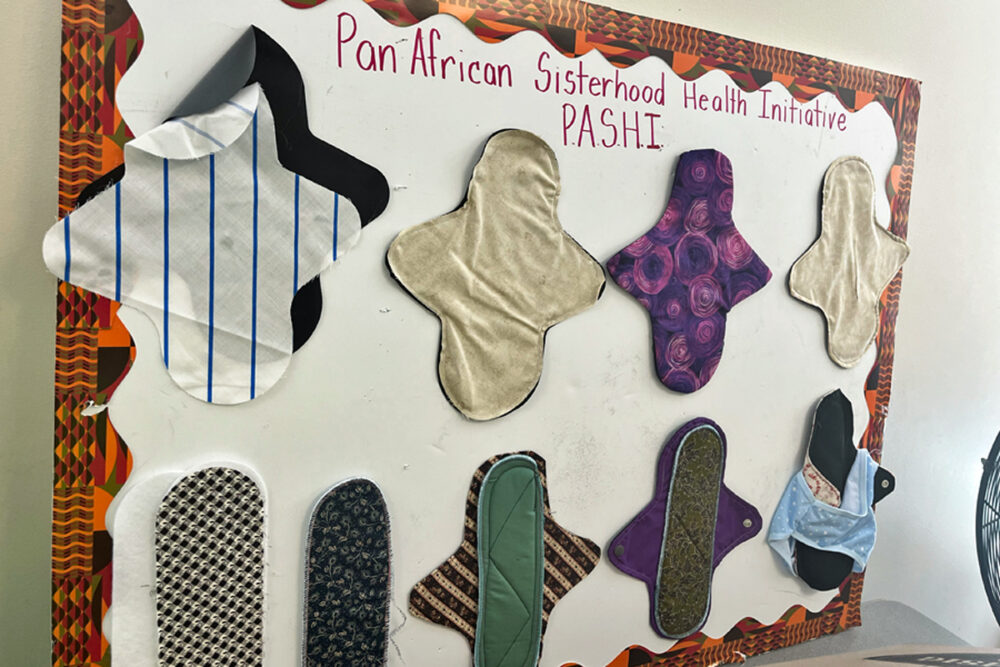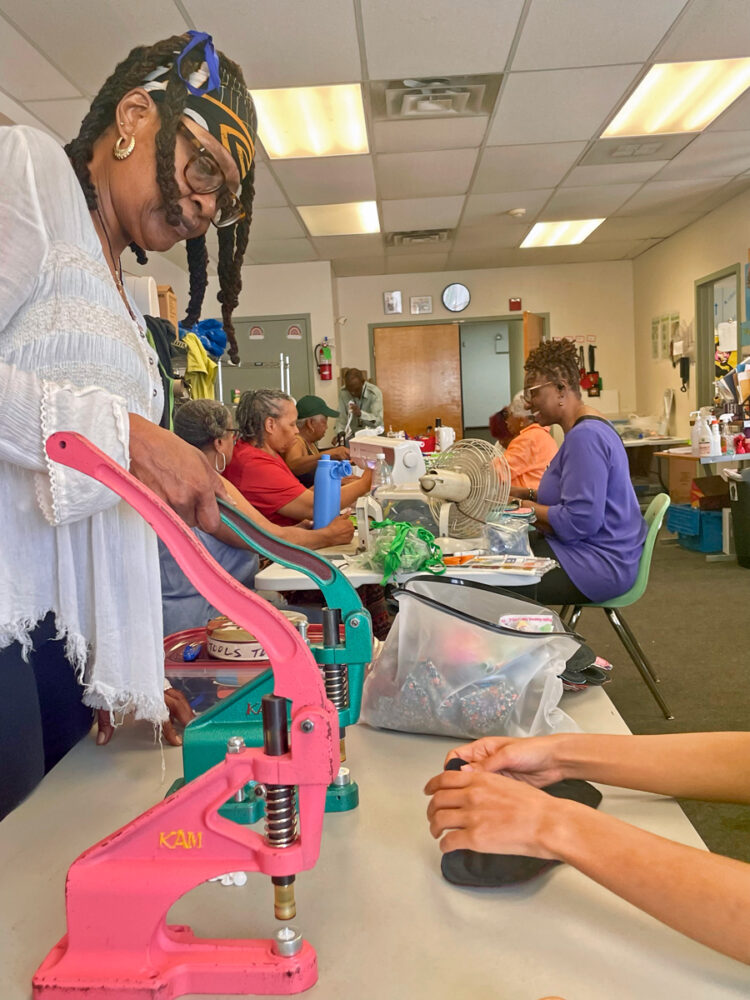
P.A.S.H.I.’s reusable pads project is reviving a legacy of sustainability and self-reliance in women’s health
How one Philly nonprofit is uplifting women’s health with handmade, eco-friendly feminine hygiene products
In North Philly, there’s an organization of Black women who are answering the call to address the issues of period poverty, one reusable pad at a time.
P.A.S.H.I. (Pan-African Sisterhood Health Initiative) has an operation located at the Ujima Friendship Peace Center, off of 17th and Lehigh Avenue.
Black Women and Ingenuity: A Historical Context
Before disposable period products became popular, women were innovating solutions out of necessity. One pioneer was Mary Beatrice Davidson Kenner, who patented the adjustable sanitary belt in 1957, but faced systemic racism that hindered her commercial success. A company withdrew interest upon learning she was Black, highlighting a familiar narrative of unrecognized contributions from Black women.
Today, the Pan-African Sisterhood Health Initiative (P.A.S.H.I.) is reclaiming this legacy through its menstrual hygiene project, which empowers women to use handcrafted reusable pads. This effort is both environmentally friendly and rooted in ancestral practices of care and self-sufficiency. Like Kenner’s vision, P.A.S.H.I. focuses on dignity, access, and community, reviving a tradition of Black women shaping wellness through their own ingenuity.
How It All Began: The Origin of the Pan-African Sisterhood Health Initiative
The visionary for the P.A.S.H.I. project is “Mama” Maisha Sullivan-Ongoza, who is also a member of the Sankofa Artisan Guild.
Sullivan-Ongoza embarked on many service trips to The Gambia in Africa. As Sullivan-Ongoza explained, “During these trips, I would often take school supplies and other items for the school we visited. We were also asked about bringing sanitary pads for the schoolgirls. It was becoming increasingly expensive to bring disposables on each trip. At the same time, I noticed a return to reusable products. After doing my research, I decided to bring the idea for a sewing project for reusable pads to the guild to make pads for the girls in The Gambia.”
What was initially thought to be a single shipment in 2019 has now expanded into over 60+ shipments to countries in Africa, South America, and the Caribbean. Once word got out about this project, more people were drawn to the opportunity to help create reusable pads for women and girls in need. P.A.S.H.I. emerged as a continuing project that meets weekly on Wednesdays, led mainly by retired professional women.

The UN defines period poverty as the inability to afford and access quality menstrual products. This affects the ability of women and girls to attend school and work due to the lack of necessary products during their menstrual cycle.
Sullivan-Ongoza shared stories that came back about how women were using ingenuity to manage their hygiene. Fathers of girls would have to weigh the decision of purchasing sanitary pads for their daughters or food for their families. Some women would use butter on a piece of cloth to form a liquid-resistant barrier, or use newspaper as a tampon.
“I don’t really like the term period poverty,” Sullivan-Ongoza explained. At P.A.S.H.I., we want women to have a sense of dignity with their menstrual care and reduce the chances of toxic shock syndrome and other infections that have detrimental effects on women’s and girls’ health. It’s about meeting people where they are and working towards providing a solution to their problem.”
How P.A.S.H.I. is addressing women’s health through the gathering of the community

The organization’s members find ways to reduce waste in all aspects of the program. By salvaging used sewing machines and suitcases for the creation and delivery processes, making adjustments to design patterns so that they can create more templates out of less fabric, and buying the zorb and organic cotton materials wholesale from Wadzoolde in Bensalem. Even down to volunteer name tags, which were crafted from extra fabric, helping to reduce paper waste while also encouraging members to commit and return each week.
“We don’t throw away anything. We’re like creative hoarders. Something that would have been thrown away can be made into something beautiful,” said Sullivan-Ongoza.
With the materials used, P.A.S.H.I.’s pads can last up to four years. Pads are also packaged with handmade side pouches made from matching bright and vibrant fabrics, which also contribute to restoring dignity to women and girls. Sullivan-Ongoza says, “Women don’t have to worry about buying disposables every month when they have our pads. We are also aware of the fact that our pads don’t contain many of the harmful chemicals like phthalates in disposables.”
P.A.S.H.I. also includes the following opportunities that uplift the community:
- Educational STEM projects for students at Sankofa Freedom Academy and Imhotep Charter High School. Sullivan-Ongoza said, “We educate students on women’s health and teach them how to create the pads themselves, and they take trips to Africa and can donate pads to schools they visit.”
- A food pantry for shared goods that would otherwise go to waste.
- Sewing dolls and clothing for young girls and boys.
- Community crafting and bonding on Thursdays, members gather to work on passion projects they would like to pursue or receive help with from the group.
When envisioning a more sustainable Philadelphia, Sullivan-Ongoza emphasizes the importance of becoming more conscious and intentional with the things we use every day.
“Most times, sustainability or ‘going green’ is perceived as being for affluent white communities, but being sustainable has always come from the necessity of being resourceful and making do with what you have. Every community can have the consciousness to pay attention to what they can cut back on in order to promote healthier and greener communities,“ said Sullivan-Ongoza.
Follow P.A.S.H.I. on Instagram to stay tuned to their continued efforts.
Photos courtesy of P.A.S.H.I.





